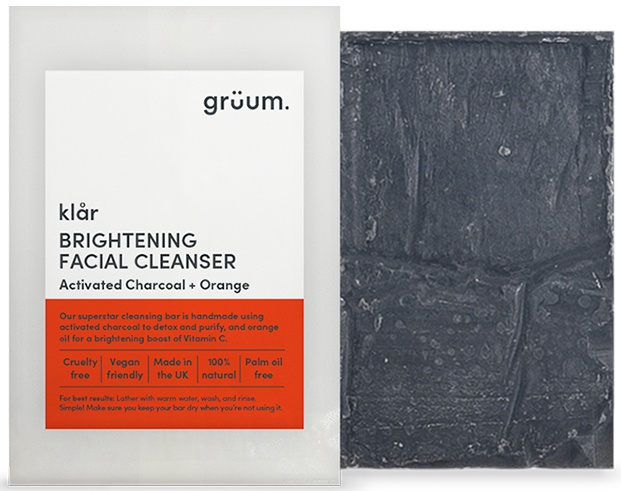
Highlights
Skim through
| Ingredient name | what-it-does | irr., com. | ID-Rating |
|---|---|---|---|
| Sodium Cocoate | surfactant/cleansing, emulsifying | ||
| Sodium Olivate | surfactant/cleansing, emulsifying, viscosity controlling | ||
| Aqua | solvent | ||
| Butyrospermum Parkii (Shea) Butter | emollient | goodie | |
| Citrus Grandis (Grapefruit) Peel Oil | perfuming | icky | |
| Limonene | perfuming, solvent | icky | |
| Citrus Aurantium Dulcis (Orange) Oil | perfuming | icky | |
| Charcoal Powder | abrasive/scrub |
Grüum Klar Brightening Facial CleanserIngredients explained


Good old water, aka H2O. The most common skincare ingredient of all. You can usually find it right in the very first spot of the ingredient list, meaning it’s the biggest thing out of all the stuff that makes up the product.
It’s mainly a solvent for ingredients that do not like to dissolve in oils but rather in water.
Once inside the skin, it hydrates, but not from the outside - putting pure water on the skin (hello long baths!) is drying.
One more thing: the water used in cosmetics is purified and deionized (it means that almost all of the mineral ions inside it is removed). Like this, the products can stay more stable over time.
Unless you live under a rock you must have heard about shea butter. It's probably the most hyped up natural butter in skincare today. It comes from the seeds of African Shea or Karite Trees and used as a magic moisturizer and emollient.
But it's not only a simple emollient, it regenerates and soothes the skin, protects it from external factors (such as UV rays or wind) and is also rich in antioxidants (among others vitamin A, E, F, quercetin and epigallocatechin gallate). If you are looking for rich emollient benefits + more, shea is hard to beat.
The essential oil coming from the rind of the grapefruit. In general, the main component of citrus peel oils is limonene (86-95% for grapefruit peel), a super common fragrant ingredient that makes everything smell nice (but counts as a frequent skin sensitizer).
Other than that, citrus peel also contains the problematic compound called furanocoumarin that makes them mildly phototoxic. In general, the more sour-bitter the fruit, the more problematic it is regarding phototoxicity: orange and clementine peel contain less of it while lemon, grapefruit, and bergamot contain some more. Be careful with it if it is in a product for daytime use.
A super common and cheap fragrance ingredient. It's in many plants, e.g. rosemary, eucalyptus, lavender, lemongrass, peppermint and it's the main component (about 50-90%) of the peel oil of citrus fruits.
It does smell nice but the problem is that it oxidizes on air exposure and the resulting stuff is not good for the skin. Oxidized limonene can cause allergic contact dermatitis and counts as a frequent skin sensitizer.
Limonene's nr1 function is definitely being a fragrance component, but there are several studies showing that it's also a penetration enhancer, mainly for oil-loving components.
All in all, limonene has some pros and cons, but - especially if your skin is sensitive - the cons probably outweigh the pros.
The essential oil coming from the sweet orange. In the case of orange (and citruses in general), the essential oil is mainly in the peel of the fruit, so it's pretty much the same as the orange peel oil (also has the same CAS number - a unique ID assigned to chemicals).
Its main component is limonene (up to 97%), a super common fragrant ingredient that makes everything smell nice (but counts as a frequent skin sensitizer).

You may also want to take a look at...
| what‑it‑does | surfactant/cleansing | emulsifying |
| what‑it‑does | surfactant/cleansing | emulsifying | viscosity controlling |
| what‑it‑does | solvent |
| what‑it‑does | emollient |
| what‑it‑does | perfuming |
| what‑it‑does | perfuming | solvent |
| what‑it‑does | perfuming |
| what‑it‑does | abrasive/scrub |





